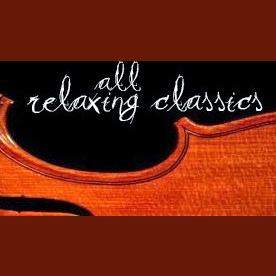A precedence-shattering concert: an Israeli orchestra playing the music of Wagner a notoriously anti-Semitic composer at Germany's Bayreuth Festival, once one of Hitler's favorite destinations.
Like all of Richard Wagner's music, performances of his piece Siegfried Idyll, is unofficially — but effectively — banned in Israel.
It's not just that Wagner was an anti-Semite. He wrote a notorious essay called "Jewishness in Music." And after his death, Wagner's family was close to Adolf Hitler. Hitler often attended the annual Bayreuth Festival, which is devoted to Wagner's music.
Audio and Video at NPR.ORG | MORE LINKS
for classical music lovers...www.ClassicalMusic.network presenting melodic favourites from The Romantic Period on the Internet 24/7. Start player...to listen.
www.classicalmusic.network
recent selections on our radio stream...
recent selections...on classical music network radio
OUR TWITTER POSTS
Simone Dinnerstein
Simone Dinnerstein (born September 18, 1972) is an American classical pianist who became celebrated, both critically and commercially, for her self-financed recording of Johann Sebastian Bach's Goldberg Variations, released in 2007.
Wikipedia | Search Amazon.com for Simone Dinnerstein




Wikipedia | Search Amazon.com for Simone Dinnerstein
Lord Harewood, Opera book editor dies
George Lascelles, the seventh Earl of Harewood, a member of the British royal family who was an internationally recognized writer on opera, died on July 11 at Harewood House, his family’s home near Leeds. He was 88. George Henry Hubert Lascelles, 7th Earl of Harewood, KBE AM (7 February 1923 – 11 July 2011), styled The Hon. George Lascelles before 1929 and Viscount Lascelles between 1929 and 1947, was the elder son of the 6th Earl of Harewood (1882–1947), and Princess Mary, Princess Royal, the only daughter of King George V of the United Kingdom and Queen Mary. He had a younger brother, The Honourable Gerald Lascelles. Lord Harewood was the eldest nephew of King George VI and was a first cousin of Queen Elizabeth II. He succeeded to his father's earldom on 23 May 1947. A music enthusiast, Lord Harewood devoted most of his career to opera. He served as editor of Opera magazine from 1950 to 1953 and as director of the Royal Opera House, Covent Garden from 1951 to 1953 and again from 1969 to 1972. He served as chairman of the board of the English National Opera (ENO) from 1986 to 1995; Managing Director of the ENO from 1972 to 1985; artistic director of the Edinburgh, Adelaide and Leeds Festivals; Managing Director of the ENO offshoot English National Opera North from 1978 to 1981. Lord Harewood served as a governor of the BBC from 1985 to 1987 and as the president of the British Board of Film Classification from 1985 to 1996. He was the author or editor of three books, Kobbé's Complete Opera Book (ed. 1954, now The New Kobbé's Opera Book, edited with Antony Peattie, latest ed. 1997), The Tongs and the Bones (an autobiography, 1981), and Kobbé's Illustrated Opera Book (ed. 1989).
(ed. 1989).
Wikipedia | Search Amazon.com for Kobbé's Illustrated Opera Book






Wikipedia | Search Amazon.com for Kobbé's Illustrated Opera Book
FREDERICK FENNELL
Frederick Fennell (July 2, 1914 in Cleveland, Ohio – December 7, 2004 in Siesta Key, Florida) was an internationally recognized conductor, and one of the primary figures in promoting the wind ensemble as a performing group. He was also influential as a band pedagogue, and greatly affected the field of music education in the USA and abroad. In Fennell's The New York Times obituary, colleague Jerry F. Junkin was quoted, saying "He was arguably the most famous band conductor since John Philip Sousa. Fennell recorded over 300 compositions on 29 albums for Mercury Records. For Mercury, Fennell recorded with the Eastman-Rochester "Pops", London "Pops" (actually the London Symphony Orchestra), and free-lance groups of New York musicians. However, best known are the twenty-two of these 29 Mercury albums that were with Fennell's own Eastman Wind Ensemble. One of these albums, Lincolnshire Posy by Percy Grainger recorded in 1958, was selected by Stereo Review magazine as one of the 50 best recordings of the Centenary of the Phonograph 1877-1977. The two volume Civil War - Its Music and Its Sounds
by Percy Grainger recorded in 1958, was selected by Stereo Review magazine as one of the 50 best recordings of the Centenary of the Phonograph 1877-1977. The two volume Civil War - Its Music and Its Sounds , recorded in December 1960, was a notable set of recordings also made with the Eastman Wind Ensemble
, recorded in December 1960, was a notable set of recordings also made with the Eastman Wind Ensemble , this time performing on original instruments. In 1961, Fennell received a citation and a medal from the Congressional Committee for the Centennial of the Civil War for these recordings. In 2003, the 1958 Mercury album Winds in Hi Fi
, this time performing on original instruments. In 1961, Fennell received a citation and a medal from the Congressional Committee for the Centennial of the Civil War for these recordings. In 2003, the 1958 Mercury album Winds in Hi Fi was chosen by the National Recording Preservation Board for the National Recording Registry. Nearly all of Fennell's Mercury recordings were reissued on compact disc.
was chosen by the National Recording Preservation Board for the National Recording Registry. Nearly all of Fennell's Mercury recordings were reissued on compact disc.
Wikipedia Bio | Search Amazon.com for Frederick Fennell








Wikipedia Bio | Search Amazon.com for Frederick Fennell
Subscribe to:
Comments (Atom)




